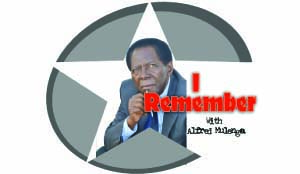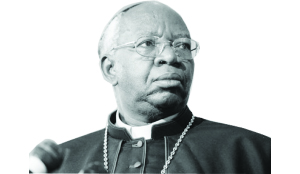 Recent events in Nigeria where Prophet TB Joshua’s Synagogue Church of All Nations’ (SCOAN) two-storey building collapsed, killing and injuring many worshippers caused me to remember the role the Church has played in the development of Zambia since Independence in 1964.
Recent events in Nigeria where Prophet TB Joshua’s Synagogue Church of All Nations’ (SCOAN) two-storey building collapsed, killing and injuring many worshippers caused me to remember the role the Church has played in the development of Zambia since Independence in 1964.
I believe many people would agree with me that no history of Zambia would be complete without highlighting the sterling job the Christian faith and indeed and other religious-based groupings like Muslims, Hindus, among others, have done in this country in the past half century.
Evidence of their practical philanthropy in all areas of human endeavour, including agriculture, education, health, ICT, mass communications, professional and vocational training is everywhere across the 50-year-old Republic.
Even on the political front, good democratic governance and the respect for basic human rights, the Church has been brutally frank, calling a spade by its name. The Church has certainly been a great agent of social change in the country. In fact, most of Zambia’s freedom struggle heroes – the founding fathers – and some of the country’s bishops and priests who pioneered the indigenisation of the Church were products of local missionary schools and seminaries, etc.
Of the members of the clergy, I believe that Archbishop Emmanuel Milingo perhaps stands out and deserves special mention for his rather revolutionary stance, akin to Germany’s 16th Century monk, Martin Luther whose radicalism triggered the Reformation in Europe when he pinned his famous 95 theses on the wall, one of them questioning the Pope’s authority and role as God’s sole representative on Earth.
Bishop Milingo also sent shockwaves across the globe with his inspirational and unique faith healings, and defied some Roman Catholic practices like celibacy by marrying a South Korean wife.
Before that the Zambian prelate was often at odds with the government and his white colleagues in Lusaka who did not like what he was doing and contrived to have him sent into ‘exile’ at the Vatican City in Rome.
Those who were there will recall that more than 70 European missionaries he was supervising were totally opposed to his spiritual healings because they believed they were incompatible with church norms. However, much to the chagrin of his opponents, the Pontiff at Vatican supported the Zambian maverick prelate as he and allowed him to conduct his healing sessions in Europe.
Looking back, I believe Zambia, as a country, was the biggest loser in the Milingo imbrogilio because if the much-loved Bishop had been allowed – and even supported by the government – to continue with healing the sick, many people currently flocking to TB Joshua’s Synagogue Church of All Nations would probably be coming to Lusaka en masse, thereby earning the cash-strapped nation the much needed foreign exchange in the process.
This is what the government of oil-rich Nigerian has done.
Authorities in Abuja, the Nigerian capital, have come not only to appreciate but recognise the important role TB Joshua’s church is playing in the country’s economic diversification programme, as his SCOAN has become a popular destination for thousands of worshippers and curious tourists from all over the world.
And reports from the Vatican this week, would tend to vindicate Bishop Milingo’s stance because under the current Pope, the Catholic Church has embarked upon some far-reaching reforms in response to some of the challenges facing the church.
The reports reminded me of a story I had written in 2009 after news broke out that Bishop Milingo had married a Korean woman – suggesting that in view of the numerous sex scandals involving priests, the church should probably revisit its stance on celibacy – and the response I got from a ‘Concerned Catholic’ in Gaborone, Botswana.
I refer to your recent article on Bishop Emmanuel Milingo’s excommunication from the Catholic Church. In my opinion, the writer of the article sought to castigate the Church for its decision to break its ties with the Bishop. The writer was clearly a proponent of married priests in the Catholic Church. He seemed to hold the view that it is impossible for one to make a choice to remain celibate in the priesthood.
I do not claim to be an expert on Catholic doctrine; however I have heard it said that when you go to Rome you must do as Romans do. Bishop Milingo had it in mind to become a Catholic priest. He even rose to the status of Bishop, which is evidence of the fact that he was in the church for a considerably long period of time. In becoming a priest Bishop Milingo must have known it would entail celibacy. He felt he had a call. A call to minister to the church in the priesthood. A call to celibacy.
I wish to disabuse readers of the notion that celibacy is a state to be deplored, an unnatural state or a punishment of some sort. Many people in our society choose to be celibate. Celibacy is defined as a state of unmarried especially as a result of a religious promise. A consequence of this state is chastity – the active choice to refrain from sexual activity and lead a pure life. The religious, nuns and Catholic priests make a choice to be celibate and chaste. They regard it as a calling to pursue a closer relationship with God to the exclusion of marriage and family life.
Many ordinary people make the choice to be chaste. Children are often chaste as a result of their youth and innocence. Many young adults choose chastity by opting to abstaining from sex until they are married. Many married people practise what is referred to as ‘marital chastity when they are continent for periods when their partners are away from matrimonial home or, are as a result of illness are unable to have normal marital relations. Many widows and widowers choose a chaste lifestyle.
The unifying factor in the above examples is this – celibacy and chastity is a choice. Remember that in Matthew 19:12 it is written Some people are incapable of marriage because they were born so; some, because they were made so by others; some because they have renounced marriage for the sake of the kingdom of heaven. Whoever can accept this ought to accept it.”
All ordained ministers of the Catholic Church, except permanent deacons, are normally chosen from men of faith who live a celibate and intend to remain celibate “for the sake of the kingdom of heaven”. They are called to consecrate themselves with undivided heart to the Lord and to the affairs of the Lord. They give themselves entirely to God and to the service of men. Celibacy is the sign of this new life to which they choose to be consecrated. When accepted with a joyous heart, celibacy radiantly proclaims the Kingdom of God.
We should pray for the good Bishop whose free choice now seems burdensome to him. But the church should not be faulted for wishing to uphold its laws. It certainly cannot be seen to allow the consecration of other married priests by Bishop Milingo, contrary to its own laws. The majority of those who have been called to celibacy and who have chosen it as their way of life are able to live it faithfully, not without struggle, as everything in life presents its unique challenges, but they live it just the same. They must be applauded for their constancy and steadfastness to their chosen path.
Those of us who are not called to be priests or nuns have a great and beautiful calling. The call holiness is universal. We are all called to make disciples of all men, not by doing anything extraordinary, but by living coherent Christian lives which will inspire others to be more Christ-like.” – Concerned Catholic, Gaborone.
Adventure in South East Asia/Hong Kong:
Dear Alfred
I have just finished reading your article in the Saturday Times of Zambia of October 11, 2014 in which you talk about your trip to the 1988 Seoul Olympic Games.
Your historical articles do provide some useful insights, particularly to those who were not there to experience or bear witness to some of the events you talk about in your articles.
I would urge you to continue with the good work you are doing but suggest that in some of the articles you take the trouble to consult some people who may have been there so that you reflect a more accurate picture of the events.
In regard to the Article above, it contains some inaccuracies which I would like to bring to your attention.
First, I was the Chef de Mission of the Zambian Delegation to the Seoul Olympic Games.
The VIPs in the delegation were: Hon. Wesley P Nyirenda – president of ZOCAGA and a Minister in the Government. Honourable Hapunda – Minister in charge of Sport at the time; Maxwell D Sichula – Chairman National Sports Council.
Hon Arthur Wina came to the Games in his capacity as Chairman of Atlas Copco but as he was also Chairman of ZAAA, he asked to be accredited for the Games and I personally facilitated his accreditation. Arthur Wina was accompanied by his wife.
His brother Sikota Wina never travelled to the Games and was not there.
I thought I should point out these small errors.
Regards,
Patrick Chamunda,
Lusaka.
*****************
Hello Mr Mulenga.
My name is Greg Lubesha, a bussinessman based in Ndola and a former employee of Zesco and immediate past captain of Ndola Golf Club.
I like your historical feature articles and please keep it up. I read your articles every week.
I am officially inviting you for a drink at Ndola Golf Club and my cell number is 0966901661 or 0955438438. God’s blessings.
Ndola.
Comments please send to: alfredmulenga777@gmail.com







